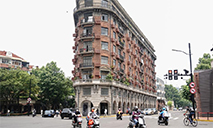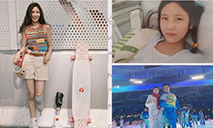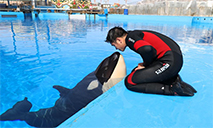Profile: Chen Dong, commander of China's new space mission
JIUQUAN, June 4 (Xinhua) -- Chen Dong, a veteran astronaut who completed his first spaceflight about six years ago, is poised for a new, more sophisticated space mission. This time, he has been appointed to the position of commander.
"Although we three are relatively young, we are fully prepared, passionate and confident," said Chen, who stood between his crewmates Liu Yang and Cai Xuzhe at Saturday's press conference, beaming with confidence.
The astronaut trio is ready and waiting to be launched on board the Shenzhou-14 spaceship and start the six-month mission that is projected to extend China's space station core module in the near-Earth orbit into a "multiple-room penthouse."
"Building China's space station is the dream of all Chinese people. We are so lucky and happy to see that the construction of the space home will be completed in our hands," Chen said.
NEW PLATFORM
Chen had worked for about a month in China's space lab Tiangong-2 in the Shenzhou-11 space mission in 2016 with commander Jing Haipeng.
"After my first space trip six years ago, my desire to go back to space has grown stronger with each passing day," Chen said.
Now, Chen will return to space on a tremendous platform, and he is expected to see the space station grow even bigger as two lab modules Wentian and Mengtian will be attached in July and in October, respectively.
On Nov. 9, 2016, the two astronauts carried out an in-orbit maintenance test using man-robotics coordination, the country's first ever such test in space.
A video clip showed that Jing and Chen were able to carry out the operation manually, with great care, and move a mechanical arm within the Tiangong-2 cabin to a certain position.
The subtle skills Chen has honed will play a huge role in his new mission. One of the Shenzhou-14 crew's tasks will be to cooperate with ground control as they test the large and small mechanical arms of the space station.
The first scientific experiment Chen did in the space lab was to rear silkworms. "We couldn't wait to open the package after we entered Tiangong-2," Chen recounted.
Thanks to careful breeding, a silkworm produced silk on the sixth day in microgravity and spun a cocoon afterward.
On the fifth day in the lab, the lettuce Chen and Jing grew sprouted in space. "It looks so fresh and a little bit greener than on Earth," Jing recalled.
In his second space mission, the crew will witness the three modules form a more stable, powerful and well-equipped space station.
"We will make good use of such a platform, carry out more complicated sci-tech experiments and strive for new achievements to serve the world and benefit all mankind," he said.
EXTRA TRAINING
Chen was born in 1978 in central China's Henan Province. Determined to become an aviator, he applied for Changchun Flight College after he graduated from high school in 1997.
Chen was not a born astronaut. In his own account, "I was a little bit puffy when I was a freshman." He could do only three to four pull-ups on horizontal bar or parallel bars while the cut-off scores were 16. His 1,500-meter run was timed nearly two minutes longer than the cut-off point.
To improve his performance, Chen wore sandbags and ran one lap more than his peers during morning exercises and did push-ups and sit-ups at night. Three months later, he obtained excellent scores on his physical tests.
In Chen's subsequent career, doing extra training has always been fundamental to his progress. In May 2010, he was recruited into China's astronaut team, along with six other aviators including Liu Yang, and started an even more challenging training regime.
"I sketched the spaceship's cockpit layout on a dozen sheets of A4 paper, stuck them on the wall of the dorm and practiced over and over to familiarize myself with the positions, shapes and colors of every switch and button," Chen recounted his days of simulator training.
"Finally, I was able to find the switches precisely with my eyes closed," said Chen.
During the overload tolerance training, Chen wore items multiple times heavier than his own body weight. To improve his vestibular function, Chen sat on a swivel chair at home and let his wife push the chair.
"Chen is a perfectionist. He never leaves problems unsolved," said Jing. He recalled that Chen once wrote down two extra answers to a question during his exam.
ON THE ROAD
Chen got married in 2005 and has 11-year-old twin sons. "My wife knows the danger of flight, but she supports me and has never complained," said Chen.
He spends most of his spare time with his family. When he is at home, he loves to tell stories to his kids. "Sometimes, I would only be able to tell one or two stories before having to rush back to the dormitory."
He once told his sons that their dad is like Astro Boy, the robot hero, and can fly up high in the sky.
After his first space mission and when Chen's physical condition improved, he increased his training again immediately.
"For an astronaut, I have only two states -- flight or on the road to flight," said Chen.
Photos
Related Stories
- Profile: Cai Xuzhe, newcomer to space, but always flight dreamer
- China launches crewed mission to complete space station construction
- China unveils Shenzhou-14 crew for space station mission
- Taikonauts to celebrate National Day in space
- See-off ceremony held for Chinese astronauts of Shenzhou-14 mission
- China discloses tasks of Shenzhou-14 crewed space mission
- China to launch Shenzhou XIV manned mission
- China discloses tasks of Shenzhou-14 crewed space mission
- China unveils Shenzhou-14 crew for space station mission
- China to launch Shenzhou-14 crewed spaceship on June 5
Copyright © 2022 People's Daily Online. All Rights Reserved.









